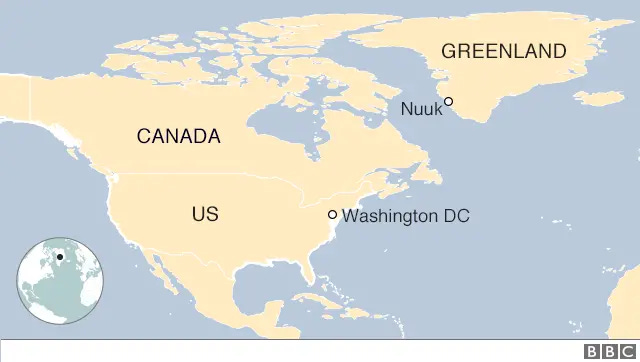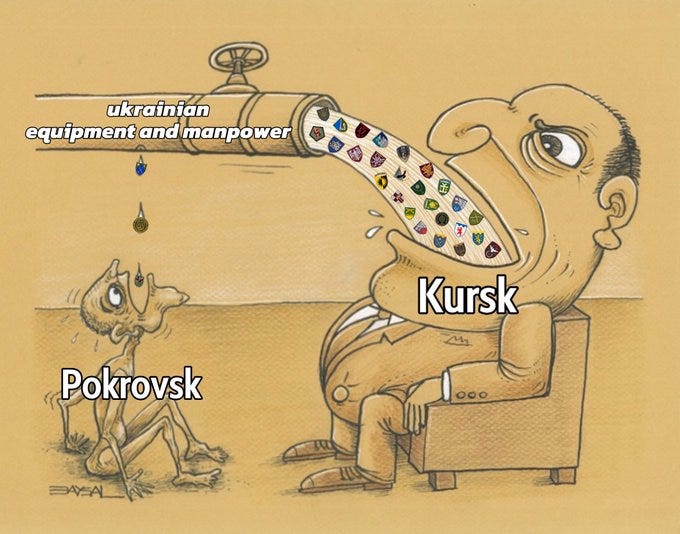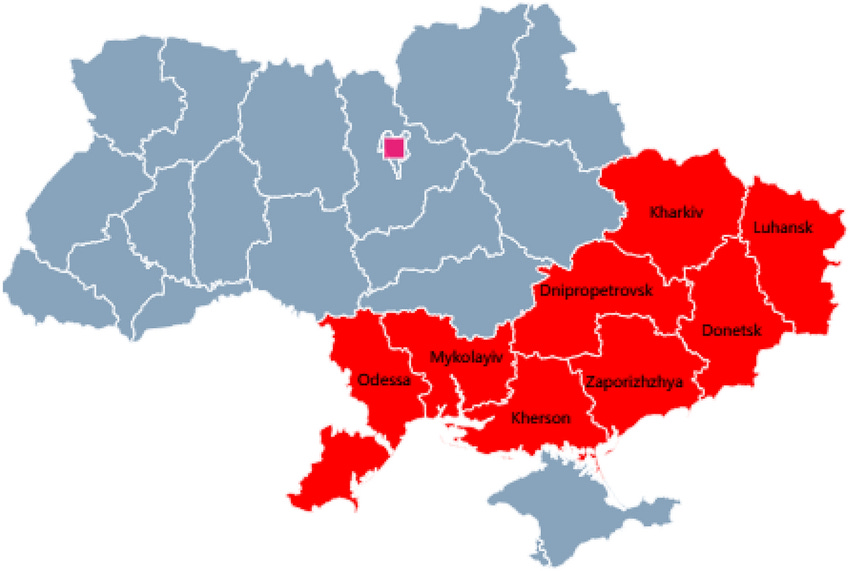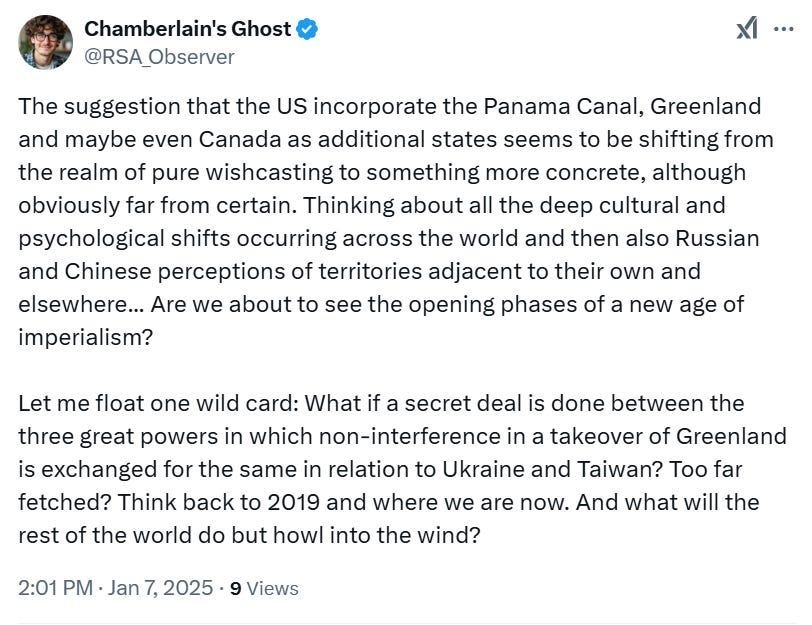Towards Greater America?
Looming defeat in Ukraine, regime change in Europe—whose geopolitical game plan will shape the future? America as leader of a globalized world or an autarkic American-Island prepared to stand alone?
In American football, former San Francisco 49ers head coach Bill Walsh is renowned for scripting the first 25 plays of a game before the action even started. His strategy was to observe how the opposing defense reacted, allowing him to adjust his play-calling for the rest of the game. By doing this, Walsh aimed to seize control early, setting the tone and dictating the flow for the remainder of the contest.
A similar gambit appears to be taking shape in Ukraine, orchestrated by the Biden Administration and its pro-war European allies. With President-elect Donald Trump making grandiose claims that he could end the war within 24 hours of taking office, the outgoing "War Party" seems intent on undermining peace in Ukraine. Their plan appears to involve Ukraine launching mid-January offensives, creating conditions that would make a swift resolution nearly impossible and exposing Trump's overconfidence as naïve. Much like Walsh’s scripted plays, the Biden Administration’s escalatory actions seem designed to shape the battlefield—political and military—before the next "quarterback" steps onto the field.
Based on media reports of the outlines of the Trump plan—freezing the conflict, NATO European troops rushing in to occupy nearly 80% of Ukraine, and a delay of ten years before Ukraine enters NATO—there is zero chance that Russia will negotiate on these terms. Russia’s demands have been crystal clear since June of 2024: Ukraine must never join NATO, must withdraw from the four partially occupied oblasts, must recognize these territories as Russian, must demilitarize and denazify, and the West must lift sanctions. Since Russia is winning the war, no concessions will be forthcoming.
The outgoing War Party feigns to not understand any of this. If they succeed in imposing their playbook on Trump, the next six months could see an escalation of the war in Ukraine, which is only to Russia’s advantage. In the aftermath of Kamala Harris's defeat, the United States and its European allies have significantly ramped up arms shipments to Ukraine, pouring in advanced weaponry along with economic handouts.
However, the Ukrainian military is facing a manpower crisis, as most of the well-trained fighters who started the war are either dead, maimed or mentally broken. Replacement troops are undertrained, unmotivated and increasingly abandoning their positions at the first signs of a Russian attack. A Ukrainian war correspondent reports that up to 1700 of 6000 men of the 155th Mechanized Brigade have deserted their posts.
As a result, Russian stormtroopers are making rapid advances along the entire southern Donetsk line of contact, steadily gaining ground against weakened Ukrainian defenses. This progress has placed the strategically critical logistics hub of Pokrovsk under increasing pressure, with the town slowly being encircled by Russian forces. Pokrovsk represents one of the last major fortified strongholds in the Donbass region, and its fall would create a crisis. Should the town collapse, it would grant Russian forces the operational space needed to launch deeper incursions into Ukrainian territory, paving the way for a spearhead advance toward the Dnipro River. Such a move would then allow Russian forces to turn north and attack from the rear the the last northern Donetsk strongholds of Kramatorsk-Slovyansk agglomeration.
Whenever Russian forces make relatively unchallenged advances in the south, as they have in recent weeks, it suggests that Ukraine is reallocating troops to bolster operations in the north. And sure enough, on January 5th, Ukraine launched a modest counteroffensive in an attempt to strike deeper into Russia's Kursk region.
As of this writing it seems Ukraine did manage to capture some territory by extending the Kursk salient. More importantly, Kiev’s armoured vehicles were equipped with enhanced electronic warfare protection, which Russian commentators indicate provided an effective 10-20 meter bubble of electronic protection against Russia's plentiful FPV (first-person view) drones. Moscow was able to field enough advanced fibre-optic-guided drones, which are immune to electronic interference, along with the more traditional artillery and helicopter attacks to stop the Ukrainian advance. The Military Summary Channel speculates the true Ukrainian goal behind the attack was to test new electronic warfare equipment and to see Russia’s reaction. Similar to Bill Walsh’s pre-programmed play-calling, Ukraine will study the results and use them to shape a much larger offensive.
Over the past weeks, there have been persistent signs that Ukraine is gathering troops to launch a large-scale offensives in the north into Russia—with the Bryansk and Belgorod regions being likely targets. Meanwhile, in the south, tensions remain high around the gigantic Zaporizhzhia Nuclear Power Station, a keystone of the Ukrainian energy grid, currently under Russian control.
Greater Russia
If Russia firmly opposes the rumoured peace plan proposed by Special U.S. Envoy Keith Kellogg—which allegedly involves freezing the conflict, Western occupation of non-Russian-controlled Ukraine, and eventual NATO membership for Kiev—what, then, is Moscow’s ultimate endgame in Ukraine?
As of now, Russia's stated objectives suggest that the war could theoretically end swiftly under certain harsh conditions. For instance, if Trump, upon taking office, agreed to a Ukrainian withdrawal from the four disputed oblasts, a binding commitment to Ukraine's neutrality, demilitarization, regime change to remove figures Russia labels as "Nazis," the lifting of all sanctions, and the removal of U.S. missile bases in Poland and Romania, Moscow might indeed end the conflict within 24 hours. However, such sweeping concessions are almost unimaginable in the current political climate, and no scenario exists in which Trump could realistically accept all these terms. Yet, given the dynamics of protracted conflict, analysts in the future may look back on these demands as relatively reasonable—just as the Istanbul Accords, rejected in Spring 2022, now seem comparatively moderate in hindsight.
For Russia to secure a decisive victory in Ukraine, it must capture four additional oblasts: Odessa, Kharkov, Dnipropetrovsk, and Nikolaev. Gaining control over these regions would consolidate Russian dominance over the entire Ukrainian Black Sea coast, significantly enhancing the security of Russia's Black Sea Fleet stationed at Sevastopol in Crimea. Beyond military advantages, such control would also establish a vital land corridor to Transnistria, the pro-Russian breakaway republic in Moldova, further entrenching Russian influence across the region.
In recent months, Russian President Vladimir Putin has noticeably increased his use of the term “Novorossiya” (New Russia) to describe the territories Russia currently occupies in Ukraine. The deliberate use of this term carries historical and ideological weight, as it evokes the imperial-era designation for territories in southern Ukraine that were incorporated into the Russian Empire during the late 18th century. Notably, several of the four additional oblasts Russia seeks to control—particularly Odessa—were integral parts of these historical entities known as Novorossiya. By invoking this term, Putin is framing the conflict as a campaign to reclaim territories Russia considers historically and culturally its own. In other words, the goal is to create a Greater Russia.
The aftermath of such a campaign would leave Ukraine as a landlocked rump state, in a position analogous to that of the Palestinian Authority in the West Bank. With Odessa under Russian control, all Ukrainian seaborne exports would depend on Moscow's goodwill, effectively stripping Kiev of economic autonomy. Russia could further consolidate its grip by establishing a "Ukrainian Authority," akin to the governance structure imposed on Palestine. In this scenario, a puppet leader, reminiscent of Mahmoud Abbas, would be installed in Kiev to serve Russian interests and administer the remnants of Ukraine on Moscow's behalf. Mimicking Israel’s West Bank strategy, Russia would maintain control indirectly, minimizing the need for a permanent and costly military occupation while solidifying its dominance over a fractured and dependent Ukraine.
Following Harris’s defeat in November, and with peace talks on the horizon, Ukraine has been vocal in demanding ironclad security guarantees from the West, such as full NATO membership or the provision of deep strike missiles. However, the stark reality is that Ukraine’s future security will hinge entirely on its ability to obey and respect Russia’s dictates. This dynamic was already implicit in the Istanbul Accords, where Russia retained veto power over any proposed security guarantees, effectively limiting Ukraine's sovereignty in shaping its own defense.
Even today, no Western country would dare directly intervene militarily in Ukraine without Russia's approval. In the Istanbul Accords, Ukraine conceded to maintaining a minimal military force and even accepted the possibility of Russian representation on its security council. Any agreements made in future peace talks are likely to impose even harsher terms, solidifying Russia's dominance. Furthermore, the absence of significant fortifications in western Ukraine underscores this reality; no Western military would dare to enter Ukraine without Russia’s explicit consent, knowing the risks of escalation. Consequently, in the aftermath of Ukraine's defeat, no meaningful security guarantees will be forthcoming from the West, leaving Ukraine's sovereignty and security effectively subordinated to Russian oversight.
Europe: Live by the US, Die by the US
The more Ukraine struggles and cedes ground to Russia, the greater the United States' strategic victory over Europe becomes. A conclusion where Russia controls Odessa and gains unrestricted access to the Polish border will provide the incoming Trump administration with immense leverage over its weakened yet arrogant European allies. Europe has long assisted and championed numerous U.S.-led regime change operations. Some succeeded, such as in Ukraine in 2014, while others failed, including Ukraine in 2004, Belarus in 2020, and Georgia in 2024. In Georgia, the European Union blatantly interfered in the internal affairs of a sovereign state, disregarding any and all diplomatic norms. Now, Europe is poised to face the consequences of its hubris, as its strategic missteps come full circle.
The golden rule of power politics for weaker entities is to never place all your eggs in one basket. Recep Tayyip Erdoğan, the narcissistic yet cunning leader of Turkey, exemplifies mastery of this strategy, skilfully balancing relationships between the West, Russia, and the BRICS nations. Europe, by contrast, erred disastrously by going all in against Russia, thereby forfeiting any leverage it might ever have against the United States. Back in 2009, European leaders were enamoured with Barack Obama, oblivious to the reality that Donald Trump represented the other side of that same feel-good American coin. Europe doubled down on supporting the Democrats in 2016, 2020, and 2024, and now stands poised to bear the full brunt of Trump’s wrath and that of his "Tech Bro" media warriors of the new era.
Although Europe may timidly protest as Elon Musk brazenly promotes milquetoast right-wing parties in Germany and Britain, U.S. interference in European affairs is far from new. What is novel, however, is that the United States has entered a phase of "warring oligarchs," where control of European governments becomes one of the key battlegrounds for billionaire dominance. On the left, "woke-garchs" like George Soros, Bill Gates, and Larry Fink of BlackRock openly meddle in European politics by installing and propping up globalist establishment figures. On the right, Elon Musk and other Tech Bros are championing populist right-wing movements, modelled after leaders like Hungary’s Viktor Orbán and France’s Marine Le Pen.
In recent years, left-leaning U.S. financial oligarchs have demonstrated their capacity to reshape European governments with ruthless precision. Following Liz Truss’s appointment as Britain’s Prime Minister, disapproving of her plans to stimulate the British economy, these forces engineered a financial rebellion that wiped out an extraordinary £300 billion from UK bond and stock markets, clearing the way for Silicon Valley oligarch Rishi Sunak to ascend to power and impose austerity.
Equally audacious was the Biden administration’s suspected sabotage of the Nord Stream pipelines—vital to Europe’s energy security—while conveniently pinning the blame on their putative ally, Ukraine. In both cases, the United States displayed just enough decorum to faintly obscure its heavy-handed interventions, enabling its vassal-satraps to preserve a semblance of dignity before their domestic audiences.
Those days of decorum are over. Following the collapse of the German government and the announcement of new elections, Friedrich Merz, leader of the globalist-right Christian Democratic Union (CDU), emerged as the favorite to become Germany's next Chancellor. Merz has vowed to escalate the war in Ukraine, promising to support Kiev in launching deep strikes into Russia with Germany's nuclear-capable Taurus missiles. Notably, Merz previously served for several years as the head of BlackRock's German board.
Recently Elon Musk entered the German political arena, first insulting outgoing Chancellor Olaf Scholz AS an “idiot” and then throwing his substantial media weight behind the populist right-wing party Alternative für Deutschland (AfD) and its leader Alice Weidel, who, naturally, used to work for Goldman Sachs.
This sparked cries of election interference from various European politicians, including some who had openly campaigned for Kamala Harris during the U.S. elections. Others had only recently returned from meddling in Georgia’s electoral process. During the 2020 BLM riots, Keir Starmer himself blatantly interfered in U.S. domestic affairs by denouncing Trump and urging Britain to support the so-called “peaceful protests” taking place across America.
After Westminster aggressively cracked down on demonstrators protesting the brutal knife murders of three working-class girls in Southport, Musk turned his guns on Starmer. These protests, which a neutral observer might indeed describe as partially violent, would still fall well within the peaceful standard Starmer himself set when labelling the Black Lives Matter riots as "peaceful." At least CNN had the candour to describe the BLM events as "mostly peaceful," a term that would also aptly describe the Southport troubles.
After Southport died down, and seeking to raise the stakes and intensify the theme of a campaign of terror against marginalized working-class girls in Britain, Musk used his influential platform on X to shine a floodlight on the large-scale, systematic rape perpetrated primarily by men of Pakistani heritage between 1997 and 2013. These so-called “grooming gangs” raped an estimated quarter-million indigenous working-class girls in Northern England’s increasingly decrepit industrial cities. During the height of this rape rampage, Keir Starmer served as Director of Public Prosecutions. From this position Starmer allegedly discouraged police and prosecutors from taking decisive action against these heinous crimes. Sir Kier Starmer was eventually knighted by the British crown, presumably for maintaining stablity in multicultural Britain by sweeping these horrendous sex crimes under the carpet.
Musk has called for new elections in Britain, criticizing the country's current political leadership as inept. While he has expressed some support for the Reform Party, he has also dismissed its leader, Nigel Farage, as too weak a personality to effectively lead the nation. If Musk manages to rally financial oligarchs to target the British pound, it’s conceivable that the Labour Party might attempt to placate American dissatisfaction by ousting the deeply unpopular Starmer as leader.
Meanwhile, in France, President Macron, who cut his teeth as a partner at Rothchild Bank, delivered a scathing critique of African leaders for asserting their national sovereignty and rejecting France’s residual colonial influence. In a classic case of a self-awareness fail, after berating African leaders for not respecting his authority, Macron then condemned Musk’s supposed encroachments on European sovereignty, accusing him of orchestrating a "new international reactionary movement" aimed at toppling globalist governments across Europe. European leaders will soon realize that they are to Americans what Africans leaders are to Europeans.
Musk shifted his attention to Europe following a contentious standoff with MAGA activists over the Tech Bros' enthusiasm for Indian cheap labour immigration facilitated through the H1-B program. Reflecting the traditional conservative ambivalence toward immigration—embracing the economic gains for business owners while lamenting the cultural consequences—Musk deftly pivoted the conversation away from gleaming Silicone Valley and towards the tragic rape camps of shoddy Rotherham, concentrating on the brutal oppression of indigenous English working class girls. This reframing tacitly tries contrasts the benefits of Indian immigration to the U.S. with the deeply damaging societal impact Pakistani immigration has had in Britain.
As a result of naïvely joining the US crusade against Russia, Europe now finds herself in a one-sided geopolitically monogamous relationship with Trump’s America. As Russia emerges victorious in Ukraine, Europe finds herself with empty armouries, emptying natural gas reserves and facing the menacing Putin on her eastern front. As time moves forward, Europe will become even more dependent on the US for energy, weapons and security. Trump is already threatening to disband NATO. If his bluster becomes reality, effete European nations will resort to individually to begging Trump for bilateral security guarantees. Security, weapons and energy all come with a price and it may be that European nations will need to promote political parties aligned with Trump’s agenda if they want any protection against comic book villains like Putin.
Towards an American-Island
Rather than passively allowing the outgoing Biden Administration's to impose a playbook on his first months in office, Trump has proactively laid the groundwork for a pivot towards his own game plan; a self-sufficient Greater America. His previously mocked calls for Greenland and Canada to join the United States are now suddenly taking on a aura of reality. Greenland's political leadership is now advocating for independence from its colonial masters in Denmark, opening the door to an alignment with the U.S. Meanwhile, the once unthinkable idea of Canada joining the United States gained momentum with the resignation of Justin Trudeau, the icon of globalist orthodoxy.
However, the prospect of liberal Canada joining the U.S. as a full-fledged partner presents serious political challenges to Trump. With a population steeped in progressive values, Canada’s inclusion with full voting rights would likely cement Democratic dominance and globalist policies for generations. Would Canadians really swap their universal healthcare system for Obama Care just to join America?
To mitigate this political danger, Trump would need to propose a unique arrangement—perhaps akin to Guam’s status—granting Canadians the limited rights territory, such as presidential primary voting privileges, while withholding representation in Congress or presidential voting rights. Such a probationary territorial status would humble any lingering arrogance and ensure Canada’s integration benefits the U.S. without compromising Trump’s nationalist visions.
A more pragmatic option might involve limiting the America-Canadian Anschluss to Canada’s resource-rich territories, such as its vast mineral and oil reserves, as well as the sparsely populated Arctic and other rural regions, leaving the urban centres and their liberal political leanings to a rump Canada, which would share the fate of rump Ukraine and the West Bank: domination by an all powerful neighbour.
It’s increasingly evident that America’s reliance on supply chains passing through China is unsustainable. As detailed in my piece Ordered Off the World-Island, the Eurasian landmass has historically been the epicentre of global power. Trump’s geopolitical strategy involves constructing a formidable—though smaller—alternative: the American-Island. This vision is premised on an eventual U.S. retreat from the World-Island of Eurasia to focus on actualizing Greater America. In the interim, strategic rear-guard actions to destabilize Eurasia, and Europe in particular, are crucial to frustrate and delay Eurasia’s unification into a cohesive, dominant bloc ready to challenge the American-Island.
Trump attempts to reclaim the Panama Canal suggest it becoming the southern border of the American-Island. While Africa will certainly fall under the sway of Eurasia, the global grey zone of struggle will unfortunately become South America. While Argentina’s Javier Milei would love nothing more than to be roughly annexed by Trump, the rest of South America may well lean towards the BRICS and Eurasia.
The most delicate geopolitical problem that a US retreat to Greater America would create is the future viability of Israel. If Greater America is indeed the plan, then the Trump / Musk campaign to install right-leaning Zionist-friendly regimes in Europe does make sense. On current trends, the growth rate of Islamic populations in Europe hint that in the near future, the EU will no longer be able to sustain pro-Israel stances. So either Zionist oligarchs should start buying up huge tracts of land in Baja California, or a demographic intervention must take place in Europe to ensure Israel’s protection well into the future.
I’ll conclude with an intriguing idea proposed by Chamberlain’s Ghost, one of my favorite commentators on Twitter/X. He suggests that China, Russia, and the U.S. may have reached an agreement to allow each other to take control of Taiwan, Ukraine, and Greenland, respectively.








I’d very very curious if Europe does reconcile with Russia and create a “Lisbon to Vladivostok” civilizational understanding. I do think it’s up in the air. One benefit of the current state of affairs in the Russia vs. West Cold War is that Russia’s human capital no longer flees to countries like Germany, etc and its wealthy are forced to reinvest in Russia. The new normal may be preferable long term.
I’m still stunned at your perspective of the “dueling oligarchs”. So obvious and yet so difficult to put it together for the average person (even to the well-read ones I suspect).